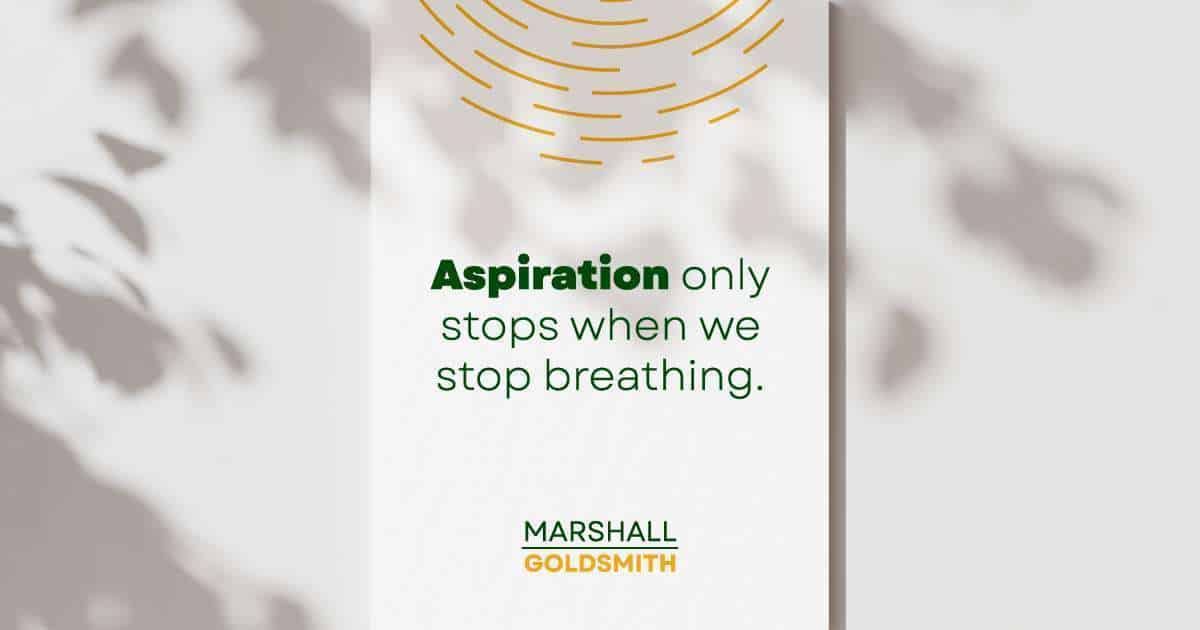Playing Favorites By Marshall Goldsmith There’s a reason I devote...
Parents sometimes remark how different their children are from each other. Despite having the same parentage, one child may be calm and composed while another might be a bundle of energy and easily excited. One child may be studious, another distracted by every little thing. We can’t predict how people will react or grow — we can only look at ourselves and see how we can create our own paths.
I’ve wondered, however, if two people with identical backgrounds and identical starts to their careers could each lead earned lives despite reaching for different values and virtues?
Do we want to become more determinative in achieving fulfillment, than what we do or want to be at any given moment? I realized that I could find the answer to this in one of my most enduring friendships.
I’m an only child, but if I had a twin brother from another mother, Frank Wagner would be that person.
Frank and I started out together in grad school in 1975, had the same teachers in the same classes, graduated together with doctorates in the same field of psychology, had the same mentors in the early parts of our careers, and ended up in identical roles as executive coaches, both settling in southern California, always within a two-hour drive of each other.
We’ve both been married for more than forty years, and we each have two children. We’re the same age. And we have the same philosophies about helping people change their behavior. When I’m unavailable to work with would-be clients, I recommend they work with Frank. There’s very little daylight between how we prepared for a career, organized our family life, and what we wanted to do professionally.
But that’s where the similarities end.
In many ways, deciding who we want to become is like adopting an ideology or credo for our life, a single premise that we rely on to interpret our past and determine our present and future.
Frank’s guiding premise was balance. He aspired to live a balanced life in which all the facets that shape a well-rounded character were given equal space and devotion. He was serious about his professional life, but never at the expense of other personal agendas: his role as an engaged husband and father, his physical fitness, his avocational pursuits of gardening and surfing. It was as if each aspect of his life—his responsibilities, his health, his extraprofessional passions—was portioned out in equal measure so he could achieve a perfect equilibrium.
You could say he was an extremist about not going to extremes. The most radical example of his balanced approach is his body weight. His ideal weight is 160 pounds, and for half a century it’s never fluctuated more than two pounds above or below that figure. If the scale reads 158 pounds, he eats more for a couple of days to return to 160. If it’s 162, he eats less.

Compared to Frank’s determined integration of all the parts of his life, I was (and still am) a hot mess of indiscipline and chaos. I loved my work. Workdays were fun. Days off left me bored. I didn’t need vacations, hobbies, and weekend rounds of golf. I figured that if work made me happy, I’d show up at home as a happy spouse and parent, which couldn’t be a bad thing. The one year I intentionally reduced my time away from home from two hundred days a year to sixty-five days—because our kids were entering their teens, allegedly the most difficult years for parents, and I flattered myself that my increased presence at home would be needed—my thirteen-year-old daughter, Kelly, at year’s end said, “Dad, you’ve overcorrected. You’re spending too much time with us. It’s okay to travel. We’re doing fine.”
Frank and I were two friends who had started our careers with identical résumés and opportunities but different gameplans for finding fulfillment. Whereas Frank wanted a balanced life, I was comfortable with extreme imbalance. Neither of us judges the other for his choices. We were creating and living our own lives. Today, in our early seventies, neither of us is burdened with regret. We’re convinced we’ve earned our lives. In the lifelong sprint to fulfillment (trust me, it’s a sprint—it goes fast), we both have earned gold medals.
How does this happen?
The answer lies in three independent variables—Action, Ambition, and Aspiration. These govern any progress we make toward living the life we seek for ourselves.
Action is what we’re doing now.
Action refers to all the specific things we do during the day—from answering a question to paying a bill to making a phone call to watching television. Whether our Action is active or passive, it reflects a conscious choice. Action is immediate, in the moment, and easy to articulate: It happened now; we just did it.
Sometimes our Action is performed in the service of our Ambition or Aspiration. Frank excelled at this. His immediate Action at mealtime was determined by his weight’s divergence up or down from 160 pounds. He ate less or more, accordingly. He was equally disciplined in other parts of his life. I, on the other hand, was more unregulated in my Action—unless it was somehow related to work. Then I was the equal of Frank in discipline. But Action for most of us is an aimless activity, subject to momentary whim or, worse, our stated objectives.
Ambition is what we want to achieve. It is our pursuit of any defined goal. It is time-bound, ending the moment we achieve the goal. It is measurable. Our Ambition is not singular. We can contain multitudes of Ambitions simultaneously — professional, avocational, physical, spiritual, financial. It may be the greatest common denominator among successful people.
Aspiration is who we want to become. It is our pursuit of an objective greater than any defined, time-bound goal. We aspire to serve others, or to be a better parent, or to embody more consistently a way of living or treating other people. Frank, who sought to lead a balanced life, excelled at this from early adulthood. I was a slow learner, never identifying a grander meaning to my life until my sixth decade.
Unlike Ambition, Aspiration doesn’t have a clearly marked finish line. It is a continuous process with an infinite time horizon. It defies measurement. It is an expression of our higher purpose.
Our aspiring may change over time, but it doesn’t go away, whether we articulate it or not. It stops when we stop breathing.

Adding Too Much Value Won’t Get You There By Marshall...
C-Suite Master Class: No, But, However By Marshall Goldsmith Continuing...
The Doerr Institute: Expanding the Market for Coaches By Marshall...
Making Leadership Development Part of the College Degree at Rice...
Sanyin Siang – Winner of the Thinkers50 Marshall Goldsmith Coaching...
Thinkers50 Marshall Goldsmith Distinguished Achievement Award in Coaching – Nominees...
Leading with Influence: What Is Influence360°? By Marshall Goldsmith Founder...
Are You a Dominator, Manipulator, Persuader or Influencer? By Marshall...
Leading with Influence: Redefining Modern Influence Part 2 By Marshall...
My mission is simple. I want to help successful people achieve positive, lasting change and behavior; for themselves, their people, and their teams. I want to help you make your life a little better. With four decades of experience helping top CEOs and executives overcome limiting beliefs and behaviors to achieve greater success, I don’t do this for fame and accolades. I do this because I love helping people!
As an executive educator and coach, I help people understand how our beliefs and the environments we operate in can trigger negative behaviors. Through simple and practical advice, I help people achieve and sustain positive behavioral change.